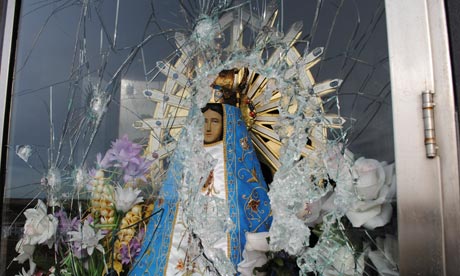By Margaret Janelle R. Hutchinson
Impunity Watch Reporter, South America
QUITO, Ecuador – Foreign Minister Ricardo Patiño announced Thursday that Ecuador would grant asylum to WikiLeaks founder Julian Assange. In the days before the decision demonstrators gathered outside the Ecuadorian embassy in London, as well as, the British embassy in Quito.

In a televised statement, Patiño said, “the government of Ecuador, true to its tradition of protecting those who seek refuge in its territory, on the premises of diplomatic missions, has decided to grant diplomatic asylum to citizen Assange based on the request he made.”
He added that the government made a fair and objective assessment of the situations described by Mr. Assange, and shares the concern that Assange may be a victim of political persecution.
In advance of the announcement from Quito, supporters of Mr. Assange gathered outside the embassy in London on Thursday, refusing police orders to move across the road until officers bundled three of them into police vans and arrested them.
The minister said his government had taken the decision after the authorities in Britain and the United States had refused to give guarantees that, if Mr. Assange were extradited to Sweden, he would not then be sent on to America to face other charges.
Patiño also said he hoped Britain would permit Mr. Assange to leave the embassy in London for Ecuador — a guarantee Britain has refused to give, saying it has a legal obligation to extradite Mr. Assange to Sweden, where is wanted to face questioning about allegations of sexual misbehavior.
President Rafael Correa, in his Twitter account, MashiRafael said “right now, Foreign Minister, Ricardo (Patiño) will announce a formal decision on the case in Ecuador concerning Assange. Nobody is going to scare us!”
Ecuador accused Britain on Wednesday of threatening to storm its London embassy to arrest Julian Assange after the U.K. issued a stern warning to the South American nation ahead of its decision on an asylum bid by the WikiLeaks founder, inciting demonstrations outside the British embassy in Quito.
In a televised address Wednesday, Patiño said that the Ecuadorian government had received a written notice from British authorities that they would “assault” the country’s embassy in London if Ecuadoran authorities failed to hand over Assange to British authorities.
“We are not a British colony,” he said. “Those times are passed.”
Analyst and professor at the Latin American Faculty of Social Sciences, Julio Echeverria, told The Associated Press that, “Ecuador has a completely unpredictable foreign policy and does not reflect an institutional maturity with regard to respect for principles, rights, procedures and internationally accepted standards.”
“Ecuador’s position means a breakdown of a relationship with both England and Sweden, because it assumes that justice is conducted under Swedish political criteria, which is unacceptable, as is the assumption that the justice of these countries would be conducted under pressure from a third country like the United States, which is also inconceivable,” Echeverria said.
For more information, please see:
Albany Times Union – Ecuador Grants Political Asylum to Assange – 16 August 2012
CNN – Ecuador Grants Asylum to WikiLeaks’ Assange – 16 August 2012
The New York Times – Ecuador Grants Asylum to WikiLeaks Founder – 16 August 2012
El Universal – Ecuador anuncia decisión de otorgarle asilo a Julian Assange – 16 August 2012
USA Today – Ecuador Grants Political Asylum to WikiLeaks’ Assange – 16 August 2012



